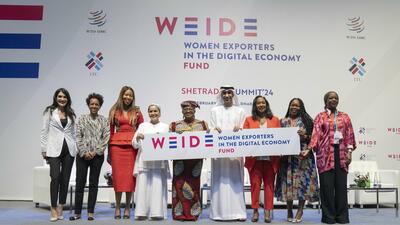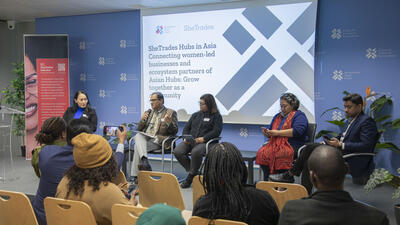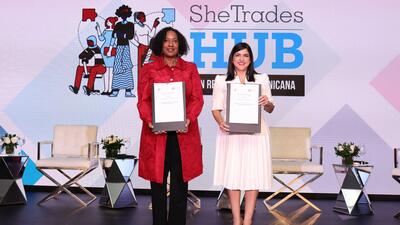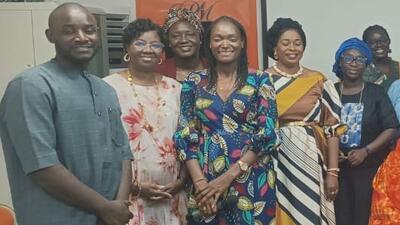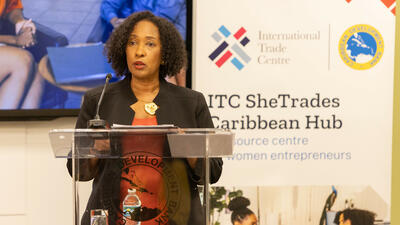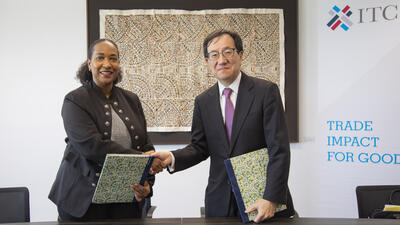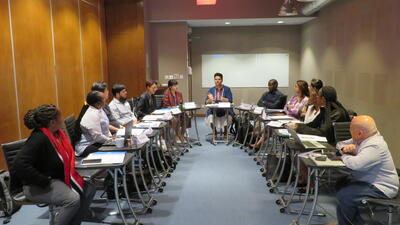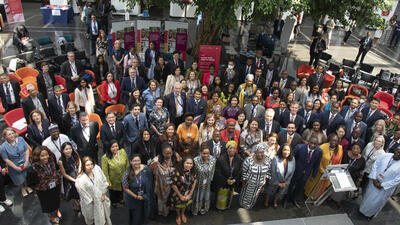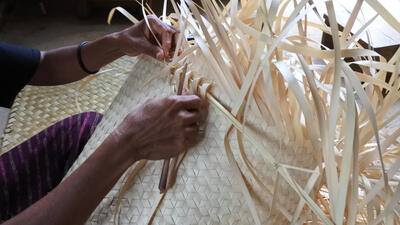
WTO, ITC launch global fund for women exporters in the digital economy
Abu Dhabi, the United Arab Emirates - ITC Executive Director Pamela Coke-Hamilton delivered the opening remarks for the launch of the WTO-ITC Women Exporters in the Digital Economy Fund.
Good afternoon and thank you for joining us as we launch this exciting new fund to support women exporters in the digital economy.
I’d like to thank H.E. Dr. Thani Ahmed Al Zeyoudi for setting the stage for today’s launch just now, and for his support throughout these past two days.
I’m honoured to be here alongside our partner in this fund, and my good friend, Dr. Ngozi Okonjo-Iweala. Through our partnership, I know we will truly raise the bar on trade and gender.
I’m also delighted that we are being joined today by the inaugural donors to this fund. Thank you for putting your trust in this joint WTO-ITC initiative, and for helping us herald the start of a new chapter in the digital transformation that has taken the world of trade by storm.
While we may be the fund’s hosts, it’s the women-led businesses we serve who are its true champions, and who have inspired us to take this step.
After the past day and a half, I’m feeling even more inspired by the women entrepreneurs we serve, whose stories have left me optimistic for what’s possible—but have underscored the urgency of acting, right now, to translate these possibilities into lasting change.
Today, we still have a world where only one in five exporting firms are led by women. These firms have a harder time convincing finance providers to give them grants, loans, or other support to grow their businesses and trade. They also have fewer connections with buyers, suppliers, and other critical actors for their exporting needs.
Why does this matter? Because the evidence shows that when women-led businesses grow, and trade, they not only earn higher incomes and create more jobs, but they are able to provide goods and services that are better-suited to societal needs. And participating in the digital economy is critical for making this all possible.
At ITC, we’ve been thinking a lot lately about what the digital transformation has looked like since we opened our doors 60 years ago—often surpassing our wildest expectations.
For instance, in 1968—just four years after ITC was formed—Stanley Kubrick’s film 2001: A Space Odyssey introduced us to HAL, the famous AI character who was a critical part of a major space mission, but who also showed us the potential downsides of digital technologies when not done right.
Today, we’re in a new digital age, one that even the most visionary filmmakers are unlikely to have predicted. And while we know that caution is key, we are also seeing that when digital technologies are used properly, they can open exciting new avenues for small businesses in trade, including those led by women.
These women-led businesses provide the food that’s on our market shelves. The home décor that we put on our living room walls. The tourism services that help us make memories with our families. The communication technologies that are allowing us to forge new connections with people around the world. The scientific innovations that are powering every aspect of our lives, from healthcare to education. And the digital economy is creating opportunities for these small businesses that we could not have dreamed of even a few years ago.
But here’s the thing: as with so many technological advances, the benefits have not extended equally. And that holds true when we consider what the digital economy has meant for women-led businesses, which often struggle to obtain the finance they need to make the most of its potential, along with the capacity to use it.
Women-led businesses, according to the World Bank, face a whopping credit gap of $300 billion. And that accounts just for those businesses in the formal sector.
That number is staggering, but I want us to get behind the numbers for a minute. It’s easy to look at a figure like that and assume “we can’t afford to fix it, there are too many problems we have to pay for elsewhere.” Here’s what happens when you actually start talking about people, rather than just numbers.
Let me tell you a story. Nhora Moreno is an entrepreneur in Calí, Colombia, helping other women who are using knowledge passed down through generations, and indigenous materials, to make products from accessories to wallets to handbags—and do so sustainably. She took part in our e-commerce program, organized by ITC’s SheTrades Latin America and eComConnect, so she would have the digital skills and approaches to reach more entrepreneurs, and further afield.
And here’s the thing with stories like Nhora’s: you can see that for each woman entrepreneur you support via the digital economy, you open the door to helping many more women as they achieve their business dreams and make their communities better. Every dollar that supports women entrepreneurs has an impact that multiplies and ripples across communities, regions, and the world at large.
In fact, many of the new digital tools and technologies at our disposal are already helping us close the gender finance gap. For instance, SheTrades now uses an online platform where women can see what financing options exist locally, what these require, and then make the connections with the right capital providers for their needs.
This new WTO-ITC fund is the next stage in our commitment to close the gap that women-led businesses face, for good. To help ensure that women are not cut off from the digital economy, but can instead shape it for the better. But we cannot do this alone. We need everyone in this room to help us champion this fund, and the ideals that underpin it.
Now, I want to take you back to Nhora and the story I told you earlier. With just a little support, she was able to go a long way, and help other women do the same.
That’s a story that hits home for me: not long ago, I had the pleasure of visiting Colombia, and I have precious memories of Calí in particular and the women I met there, many of them just like Nhora.
I cooked Afrocolombian dishes alongside them. I heard about their dreams and aspirations, their fears and their achievements. They told me about their families and what they hoped to make possible for them. And I realized just how much we had in common.
I grew up in a community where cooking together was a way of showing how we cared for one another. Where every dish we prepared was both a continuation of a long tradition and the start of a fresh, new adventure. And when I went to Colombia, I experienced the exact same dynamic. I realized that the dishes we cook, the things we make, the stories we share as women have the potential to change minds, to change hearts, and to change lives.
And in a world where, too often, we focus on what differences set us apart, finding what we have in common is a rare gift. We need more of that. And I sincerely hope that this fund can finally help us get there.
Now, I want to close by dedicating this fund launch to one of our own: to an inspiring young woman who left us far too soon.
Cristina Collado Martí, or Cris as we knew her, joined our ITC team in early 2019 as a consultant. Cristina was part of the team that delivered that same project in e-commerce project for women in Latin America. She put her heart and soul into the project and its beneficiaries.
Cris is the person I think of when I hear the phrase “be the change you want to see in the world.” In her amazing thirty-one years of life, she never stopped fighting for what was right. In her years at ITC, she did incredible work supporting women-owned businesses, pushing the boundaries of what was possible thanks to digital tools and solutions.
We lost her only months ago in a tragic accident. And I wish, from the bottom of my heart, that she could have been with us for this fund launch today.
So that’s why I’m here today. Not to merely launch a fund, give a speech or stand on this podium.
I’m here to honour Cris’ memory and on behalf of all my staff working to empower women through digital trade, one SME at a time.
I’m here for Nhora and all the women in this room, fighting for their rightful place in the marketplaces of the world, one click at a time.
Thank you, all, for being here too.




